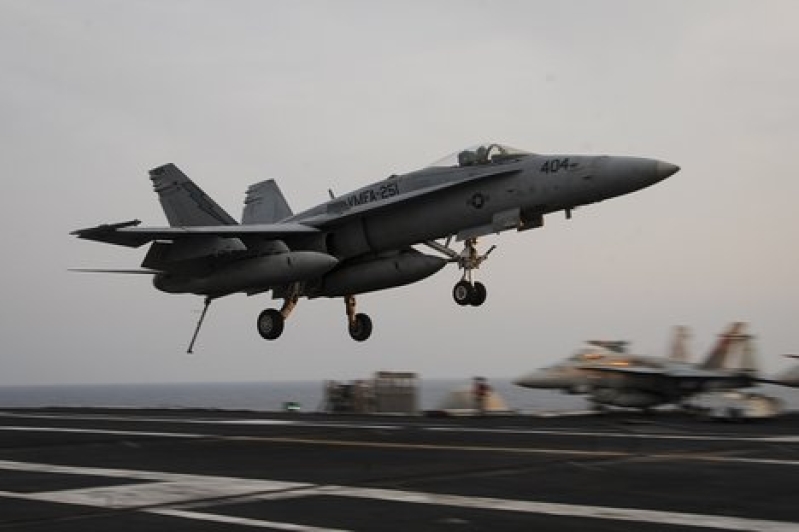
U.S.-led air strikes have hit at least 175 targets in the Islamic State's main oil-producing region over the past month, as Washington intensifies efforts to disrupt a key revenue source estimated to provide more than $1 million a day to the militant group.
Those strikes include 116 oil tanker trucks hit by coalition forces earlier this week as the United States targeted the vehicles for the first time in the wake of last Friday's suicide and shooting attacks in Paris claimed by Islamic State.
The stepped-up bombing campaign has also targeted oil rigs, pumps and storage tanks, according to a Reuters tally of air strikes provided by the Pentagon since Oct 22.
The campaign marks a more aggressive U.S. approach. Such targets had previously been considered off limits by the U.S.-led coalition as it sought to avoid civilian casualties and limit the damage to oil infrastructure that could be needed later by a new Syrian government.
The Pentagon said last Friday that its recent air strikes in Syria had inflicted "significant damage" to Islamic State's ability to fund itself. Dubbed "Tidal Wave II", the strikes have been concentrated on oil facilities near Dayr Az Zawr and Abu Kamal, which provide an estimated two-thirds of Islamic State's oil revenue.
It remains unclear how far along the Pentagon campaign on Islamic State oil infrastructure was toward achieving U.S. objectives and how much bigger the pool of potential targets might be. In the past, Islamic State has been able to repair oil facilities damaged in air strikes in as little as 24 hours.
The goal this time is to knock oil fields out of commission for a year or more without destroying them completely. That would deprive the extremist group of revenues but allow oil resources to be accessed by other forces if and when Islamic State is forced out of the territory it currently occupies.
"Nobody wants this to be another Baiji," one U.S. official said, referring to the disputed Iraqi oil refinery that has been rendered unusable by U.S.-led strikes and bombings.
"Everything that we're doing carries a timeline attached to it," the official said.
VARIED TARGETS
The civilian fuel trucks hit this week are viewed as a crucial link for the extremist group's oil business as they are used to transport oil across Islamic State territory and sell it to residents who use it to power generators and vehicles.
"We finally blew up a bunch of oil trucks," said former State Department counter terrorism coordinator Daniel Benjamin. "It's not entirely clear to me what took so long."
Pentagon spokesman Peter Cook, speaking at a briefing on Tuesday, said no civilians appear to have been hurt in the truck strikes.
The targets can vary. On Nov. 8, coalition forces hit three refineries and three pump sites. On Nov. 2, they hit 3 cranes, two construction vehicles, an oil pump and a pump truck.
Air strikes last year against targets such as mobile refineries had cut the group's oil revenues from $3 million a day to under $1 million a day, according to several independent estimates.
But the group was able repair those facilities quickly, U.S. officials say. It may struggle to do after the most recent bombings.
"They don't have the wherewithal, the skill set and the materials to repair the oil wells themselves," said Matthew Levitt, a former U.S. Treasury Department official now at the Washington Institute for Near East Policy.
The new strategy carries some risk. An aggressive bombing campaign may permanently disable oil wells and other facilities, rendering them useless for any future Syrian government.
"You'd want those to be available ultimately for the legitimate governments that could follow, but that's just not on the horizon right now. And meanwhile the Islamic State is making a lot of money," Levitt said.
Coalition forces also run a greater risk of killing civilians who work in the oil trade. And because most of the petroleum is sold within the territory controlled by Islamic State, rather than exported to other countries, any disruption in supply would likely make life harder for a population that already is struggling to make ends meet.
Islamic State is believed to rely on multiple revenue streams to finance its activity.
Benjamin said some reports suggest Islamic State still earns as much as $40 million per month from oil sales, a total that further strikes could significantly reduce.
But a February report by the Financial Action Task Force, an international anti-money laundering body, found that Islamic State makes most of its money by taxing or extorting those who live in the area it controls, rather than selling oil. It also profits from kidnapping and the sale of antiquities.





![[Exclusive Interview] A revelation within the brink of life and death — Meg Leung’s mission in Christian art](https://www.gospelherald.com/media/cache/thumbnail/7/21/72163sp_273w_150h_1x_1y.jpg)

